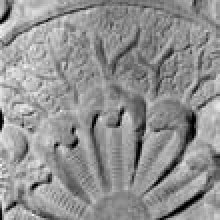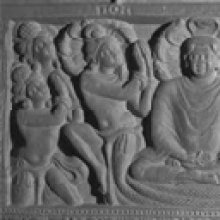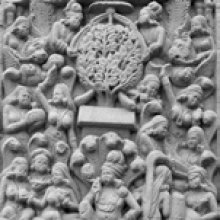Mucalinda: 4 definitions
Introduction:
Mucalinda means something in Buddhism, Pali, Hinduism, Sanskrit. If you want to know the exact meaning, history, etymology or English translation of this term then check out the descriptions on this page. Add your comment or reference to a book if you want to contribute to this summary article.
Alternative spellings of this word include Muchalinda.
Images (photo gallery)
In Buddhism
Theravada (major branch of Buddhism)
Source: Pali Kanon: Pali Proper Names1. Mucalinda. A legendary king, descended from Mahasammata. Mhv.ii.3; Dpv.iii.6; Mtu.i.348.
2. Mucalinda
A tree near the Ajapalanigrodha in Uruvela. The Buddha spent there the third week after the Enlightenment. There was a great shower of rain, and the Naga king, Mucalinda, of the tree, sheltered the Buddha by winding his coils seven times round the Buddhas body and holding his hood over the Buddhas head (Vin.i.3; J.i.80; BuA.8, 241; Ud.ii.1; Mtn.iii.300, 302; DhSA.35).
The Udana Commentary (100f.; see also MA.i.385) adds that the space provided by the Nagas coils was as large as the floor space of the Lohapasada and that the Naga king lived in a pond near the tree.
3. Mucalinda. A king of long ago. He is mentioned (J.vi.99) in a list of those who, in spite of having given great gifts, could not penetrate beyond the realms of sense. He is, perhaps, identical with Mucalinda (1), and probably also with Mujalinda (q.v.).
4. Mucalinda. A lake in Himava, north of Nalicapabbata. Vessantara and his family passed it on their way to Vankagiri, which was near by (J.vi.518, 519, there is a description of it at J.vi.534 and again at 539).
It seems also to have been called Sumucalinda (E.g., J.vi.582).
Mucalinda is one of the great lakes of Himava. D.i.164.
5. Mucalinda. One of the chief Yakkhas to be invoked by the Buddhas followers in time of need. D.iii.205.
6. Mucalinda. A mountain. Ap.ii.536 (verse 86).
Theravāda is a major branch of Buddhism having the the Pali canon (tipitaka) as their canonical literature, which includes the vinaya-pitaka (monastic rules), the sutta-pitaka (Buddhist sermons) and the abhidhamma-pitaka (philosophy and psychology).
General definition (in Buddhism)
Source: Wisdom Library: BuddhismMucalinda (मुचलिन्द) (son of Mahāmucala and father of Sāgara) is the name of an ancient king from the Solar dynasty (sūryavaṃśa) and a descendant of Mahāsaṃmata, according to the Mahābuddhavaṃsa or Maha Buddhavamsa (the great chronicle of Buddhas) Anudīpanī chapter 1, compiled by Ven. Mingun Sayadaw. These twenty-eight kings were of long lives of asaṅkhyeyya (asaṃkhyeya) years. The twenty-seven kings [viz., Mucalinda] after Mahāsammata were his descendants. Some of these twenty-eight kings reigned in Kusavatī City, others in Rājagaha and still others in Mithilā.
Languages of India and abroad
Pali-English dictionary
Source: BuddhaSasana: Concise Pali-English Dictionarymucalinda : (m.) the tree Barringtonia Acutangula.

Pali is the language of the Tipiṭaka, which is the sacred canon of Theravāda Buddhism and contains much of the Buddha’s speech. Closeley related to Sanskrit, both languages are used interchangeably between religions.
Sanskrit dictionary
Source: Cologne Digital Sanskrit Dictionaries: Monier-Williams Sanskrit-English DictionaryMucalinda (मुचलिन्द):—[varia lectio] for mucilinda q.v.
Sanskrit, also spelled संस्कृतम् (saṃskṛtam), is an ancient language of India commonly seen as the grandmother of the Indo-European language family (even English!). Closely allied with Prakrit and Pali, Sanskrit is more exhaustive in both grammar and terms and has the most extensive collection of literature in the world, greatly surpassing its sister-languages Greek and Latin.
See also (Relevant definitions)
Starts with: Mucalinda Vagga, Mucalinda Vana.
Full-text: Sumucalindasara, Mujalinda, Niceluvana, Nalika, Sagara, Mahamucala, Vankagiri, Ketumati, Mucala, Mucilinda, Sara, Vessantara Jataka, Uruvela.
Relevant text
Search found 12 books and stories containing Mucalinda; (plurals include: Mucalindas). You can also click to the full overview containing English textual excerpts. Below are direct links for the most relevant articles:
Vinaya Pitaka (3): Khandhaka (by I. B. Horner)
On Mucalinda < [1. Going forth (Pabbajjā)]
At the Rājāyatana tree < [1. Going forth (Pabbajjā)]
First recitation section < [17. Schism in an Order (Saṅghabheda)]
The Great Chronicle of Buddhas (by Ven. Mingun Sayadaw)
Part 6 - The Week at Mucalinda Lake (Mucalinda Sattāha) < [Chapter 8 - The Buddha’s stay at the Seven Places]
Part 7 - The Week at Rājāyatana Tree (Rājāyatana Sattāha) < [Chapter 8 - The Buddha’s stay at the Seven Places]
Chapter 5 - The Prophecy < [Volume 1.1]
Maha Prajnaparamita Sastra (by Gelongma Karma Migme Chödrön)
Appendix 6 - The 57 days between Buddha’s enlightenment and his first sermon < [Chapter XIII - The Buddha-fields]
The Buddha and His Teachings (by Narada Thera)
Vietnamese Buddhist Art (by Nguyen Ngoc Vinh)
4. Thailand Sculptures (c): Srivijaya Period (Hindu-Javanese) < [Chapter 4 - The Sculpture and its Reciprocal Influence]
Apadana commentary (Atthakatha) (by U Lu Pe Win)
Becoming of Buddha and Defeating Sensual Pleasure < [Part 3 - Discourse on proximate preface (santike-nidāna)]


